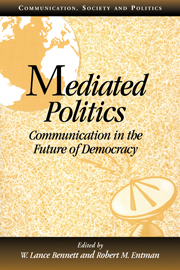Book contents
- Frontmatter
- Contents
- List of Figures
- List of Tables
- Contributors
- Preface
- Acknowledgments
- 1 Mediated Politics: An Introduction
- Part 1 Democracy and the Public Sphere
- Part 2 Citizens, Consumers, and Media in Transition
- Part 3 Mediated Political Information and Public Opinion
- Part 4 Mediated Campaigns
- 15 Issue Advocacy in a Changing Discourse Environment
- 16 Implications of Rival Visions of Electoral Campaigns
- 17 Mediated Electoral Democracy: Campaigns, Incentives, and Reform
- 18 “Americanization” Reconsidered: U.K.–U.S. Campaign Communication Comparisons Across Time
- Part 5 Citizens: Present and Future
- Index
17 - Mediated Electoral Democracy: Campaigns, Incentives, and Reform
Published online by Cambridge University Press: 05 June 2012
- Frontmatter
- Contents
- List of Figures
- List of Tables
- Contributors
- Preface
- Acknowledgments
- 1 Mediated Politics: An Introduction
- Part 1 Democracy and the Public Sphere
- Part 2 Citizens, Consumers, and Media in Transition
- Part 3 Mediated Political Information and Public Opinion
- Part 4 Mediated Campaigns
- 15 Issue Advocacy in a Changing Discourse Environment
- 16 Implications of Rival Visions of Electoral Campaigns
- 17 Mediated Electoral Democracy: Campaigns, Incentives, and Reform
- 18 “Americanization” Reconsidered: U.K.–U.S. Campaign Communication Comparisons Across Time
- Part 5 Citizens: Present and Future
- Index
Summary
INTRODUCTION
The quality of democracy is decisively influenced by the performance of the actors engaged in the process that most centrally defines a political system as democratic: campaigns and elections. To capture the essential dynamic of this core democratic political process, it is necessary to model the communications among candidates, media, and voters, with other players (e.g., parties, interest groups) relegated to lesser roles.
ELECTORAL TRIANGLE MODEL
The “electoral triangle” depicted in Figure 17.1 is such a model. The practices spawned by these interactions in an American presidential election, for example, represent the most important evidence of the normative adequacy of American representative democracy. Such practices also determine whether the process fosters community or alienation; policy consensus or confusion.
The positioning of the actors in Figure 17.1 is rooted in various classical democratic ideals. Thus, “sovereign” citizens are atop the triangle with candidates cast as “supplicants” and media as “servants.” This reflects doctrines of popular sovereignty and protective democracy. The specified behaviors are both consistent with democratic ideals and implied by prominent criticism of contemporary campaign practice. For example, many critics, especially voters, remain unhappy with the candidates' tendency to evade issues and attack opponents (cf. Ansolabehere and Iyengar 1995; Buchanan 1991), practices that have been around in one form or another since the American founding. The implicit wish made explicit in the model is that candidates emphasize their own plans and qualifications and strike tones more likely to inspire than alienate. The democratic ideal requires a candidate debate that does not repel or confuse but rather interests and informs sovereign citizens.
- Type
- Chapter
- Information
- Mediated PoliticsCommunication in the Future of Democracy, pp. 362 - 379Publisher: Cambridge University PressPrint publication year: 2000
- 1
- Cited by



